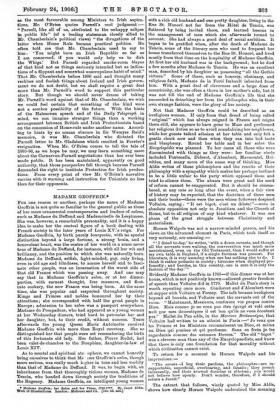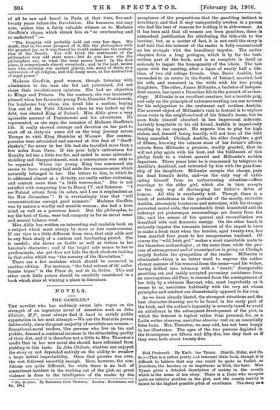MADAME GEOFFRIN.*
FOB one reason or another, perhaps the name of Madame Geoffrin is not quite so familiar to the general public as those of her more ornamental contemporaries and leaders of salons, such as Madame du Deffand and Mademoiselle de Lespinasse. She was, however, a remarkable personality, and it is a happy idea to make her the central figure of a book dealing with French society in the later years of Louis XV.'s reign. For Madame Geoffrin, by birth purely bourgeoise, with no special distinction beyond a large fortune, a, strong brain, and a benevolent heart, was the centre of her world in a sense never true of Madame du Deffand, for instance, with all her wit and brilliancy, and the position to which she was naturally born. Madame du Deffand, selfish, light-minded, gay, only living, even in old age and blindness, to amuse herself and to fasci- nate other people, was an incarnation of the worst side of that old France which was passing away. And one may say that in Madame Geoffrin's salon, or at her dinner- parties, with earnest thought, free manners, and first- rate cookery, the new France was being born. At the same time, she was popular and respected throughout society. Kings and Princes and nobles honoured her by their attentions ; she corresponded with half the great people in Europe; admission to her salon was a passport everywhere. Madame de Pompadour, who had appeared as a young woman at her Wednesday dinners, tried hard to patronise her and her daughter, but, to their credit, without success. Years afterwards the young Queen Marie Antoinette received Madame Geoffrin with more than Royal courtesy. She so distinguished her that people were set remembering the birth of this fortunate old lady. Her father, Pierre Rodet, had been valet-de-chambre to the Dauphine, daughter-in-law of Louis XIV.
As to mental and spiritual atn isphere, we cannot honestly bring ourselves to think that Ma .tme Geoffrin's salon, though more serious, was really much higher in tone and less worldly than that of Madame du Deffand. It was, to begin with, an inheritance from that thoroughly vicious woman, Madame de Tencin, who handed down through society the traditions of the Regency. Madame Geoffrin, an intelligent young woman * Madame Geoffrin: her Salon and her Times, 1760.1777. By Janet Aldis. With 16 Illustrations. London: Methuen and Co. [10s. fid. net.]
with a rich old husband-and one pretty daughter, living in the Rue St. Honore not far from the Hotel de Tencin, was flattered by being invited there, and learned lessons in the management of men which she afterwards turned to account. She had always a good deal of social ambition. It began to be gratified when, after the death of Madame de Tencin, some of the literary men who used to frequent her house transferred themselves to the Rue St. Honore, and lived mostly from that time on the hospitality of Madame Geoffrin. At first her old husband was in the background ; but he died a few months after Madame de Tencin. He was an excellent man, described by his daughter as possessing "all the Gothic virtues." Some of these, such as honesty, obstinacy, and religious faith, Madame de la Ferte Imbault inherited, from him. With a great deal of cleverness and a large dose of eccentricity, she was often a thorn in her mother's side, but it
was not till the end of Madame Geoff tin's life that she succeeded in detaching her from the philosophes who, in their
own strange fashion, were the glory of her society.
Not that Madame Geoff rin could be described as an irreligious woman. If only from that dread of being called "original" which has always reigned in France and reigns there still, she appears to have gone to Mass and performed her religious duties so as to avoid scandalising her neighbours, while her guests talked atheism at her table and only felt a
gentle check now and then when they ran into bad taste and blasphemy. Round her table and in her salon the Encyclopedie was planned. To her came all those who were discontented with things as they were : her familiar circle
included Fontenelle, Diderot, d'Alembert, Marmontel, Hel- vetius, and many more of the same way of thinking. Miss Aldis writes of these philosophers and the results of their philosophy with a sympathy which makes her perhaps inclined to be a little unfair to the party which opposed them and tried to silence them. The abuses were great and the need of reform cannot be exaggerated. But it should be remem- bered, at any rate so long after the event, when a fair view of history may be expected, that the doctrines of these men and their books—these were the men whose followers despised Voltaire, saying "Ii eat bigot, c'est un deiste!"—were in absolute opposition not only to Jesuitism and the Church of Rome, but to all religion of any kind whatever. It was one phase of the great struggle between Christianity and materialism.
Horace Walpole was not a narrow-minded person, and his views on the advanced element in Paris, which took itself so very seriously, are amusing :—
" I dined to-day,' he writes, 'with a dozen savants, and though all the servants were waiting, the conversation was much more unrestrained, even on the Old Testament, than I would suffer at my own table in England, if a single footman was present. For literature, it is very amusing when one has nothing else to do. I think it rather pedantic in society ; tiresome when displayed pro- fessedly; and besides, in this country, one is sure it is only the fashion of the day.'" Evidently Madame Geoffrin in 1765—if this dinner was at her house, which is not positively known—allowed greater freedom of speech than Voltaire did in 1770. Mallet du Pan's story is worth repeating once more. Condorcet and d'Alembert were at supper with Voltaire at Ferney. The talk became irreligious beyond all bounds, and Voltaire sent the servants out of the room. "Maintenant, Messieurs, continuez vos propos centre Dieu. Mais comma je ne veux pas etre egorge et vole cette nuit par mes domestiques il eat bon qu'ils no vous ecoutent pas." Mallet du Pan adds, in the Mercure Britannigu,e, that
Voltaire had written to an atheist in Paris :—" Je veux qua les Princes et lea Ministres reconnaissent un Dieu, et meme un Dieu qui punisse et qui pardonne. Sans ce frein je lee regarderais corn me des animaux feroces." The old "bigot" was a cleverer man than any of the Encyclopaedists, and knew that there is only one foundation for that morality without which civilisation cannot exist.
To return for a moment to Horace Walpole and his im pressions :—
" The savans—I beg their pardons, the philosophes—are in- supportable, superficial, overbearing, and fanatic; they preach incessantly, and their avowed doctrine is atheism ; you would not believe how openly. Don't wonder, therefore, if I should return a Jesuit."
The extract that follows, wisely quoted by Miss Aldis, shows how clearly Horace Walpole understood the meaning
of all he saw and heard in Paris at that time, five-and- twenty years before the Revolution. His keenness, one may note, makes him a fairly valuable witness as to Madame Geoffrin's clique, which struck him as "so overbearing and so underbred" :—
" The Dauphin will probably hold out very few days. His death, that is, the near prospect of it, fills the philosophers with the greatest joy, as it was feared he would endeavour the restora- tion of the Jesuits. You will think the sentiments of the philosophers very odd state news—but do you know who the philosophers are, or what the term means here ? In the first place, it comprehends almost everybody ; and in the next, means men who, avowing war against popery, aim, many of them, at a subversion of all religion, and still many more, at the destruction of regal power."
Madame Geoffrin, good woman, though listening with admiration to the men she fed and patronised, did not share their revolutionary opinions. She had no objection to Kings and Princes. On the contrary, she was immensely pleased when her favourite young Pole, Stanislas Poniatowski, the handsome boy whom she loved like a mother, buying him out of the Petit ChiMet when he was locked up for debt, was elected King of Poland. Miss Aldis gives a very agreeable account of Poniatowski and his adventures. He represented, as she says, the romance of Madame Geoffrin's life. It really showed courage and devotion on her part to start off at sixty-six years old on the long journey across Europe to visit. King Stanislas at Warsaw. Her contem- poraries were astonished and amused at this feat of " Geoff- rinska's," for never in her life had she travelled more than a few miles from Paris. If the poor lady's enthusiasm for Royalty led her a little too far, and ended in some misunder- standing and disappointment, such a consequence was only to be expected. Where her young King was concerned she seems to have completely laid aside the common-sense which naturally belonged to her. Her letters to him, in which he is addressed almost as a divinity, are really rather sickening, and contain more than "a little irreverence." She is not satisfied with comparing him to Henry IV. and Solomon. "I see Poland reborn from its ashes, and I see it resplendent as the New Jerusalem" ! It is everlastingly true that " evil communications corrupt good manners." Madame Geoffrin was by nature a worthy and sensible woman ; she had a keen mind as well as a generous heart. But the philosophes, to say the best of them, were bad company as far as moral sense and mental balance went.
Miss Aldis has written an interesting and readable book on a subject which must always be more or less controversial.
If our view is a little different from hers, that only adds zest to any fresh study of a curious and fascinating period. She is candid ; she shows us faults as well as virtues in her heroine's character; and if the bright side seems to her to predominate, she yet does not hide the dark shadows lurking in that salon which was "the nursery of the Revolution." There are a few mistakes which should be corrected in another edition. For instance, "the fatal retreat of th' unfor- tunate brave" is the Place de, not de /a, Greve. This and other such little points should be carefully considered in a book which alms at winning a place in literature.











































 Previous page
Previous page